Schools’ conference
Students, teachers, museum staff, historians, freelance artists, actors and a film crew came from all over Britain to join our schools’ conference in Birmingham. We were also delighted to welcome Irish groups from Dublin and Kerry and our guest speaker from Australia, Kobi Watson. The event took place at the Birmingham and Midland Institute.
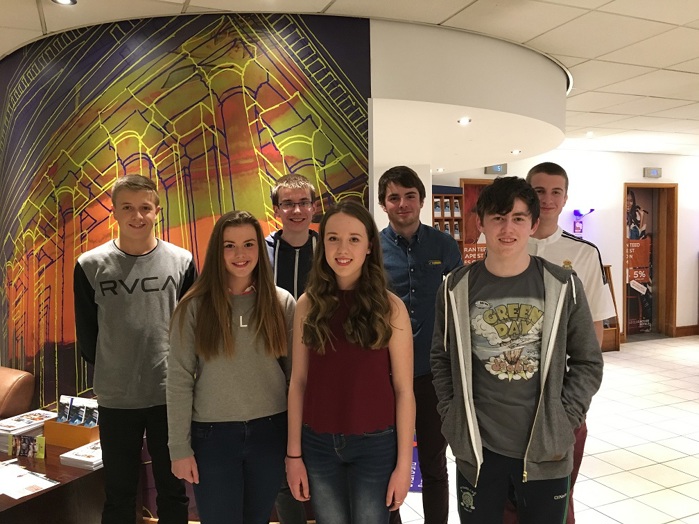
Students from schools in Australia, Scotland and Ireland. Photo: L. Edmonds
This was the final event to bring together a wide range of projects and activities which had taken place since May 2014 when we started the Gallipoli Centenery Education Project. The day was full of highlights:
Our keynote speaker Martin Purdy really did give us a key note, using the title ‘Why is Gallipoli important?’. Rather than looking at specific events from the history of Gallipoli he made us think about what the campaign means in the different countries and communities which took part. He used a quote from the historian Edward Hallet Carr as his theme: “History is not unlike a mountain in that it can appear very different depending on which angle it is viewed from…” We came back to this idea many times during the day.
The first school to present was West Buckland School in Devon. Travelling to Gallipoli with us in October 2015, pupils from the school read moving eulogies about local men who died at Gallipoli, including former pupils of the school itself. As a separate project, GCSE art students at the school worked with an artist to create 3D works which balanced the experiences of the soldiers at Gallipoli with that of their families back at home. These projects were part of a much wider range of drama and film activities carried out in North Devon, involving a further six schools. Like all of the projects we heard about during the day, the activities were based on detailed research about soldiers who fought at Gallipoli.
Rebecca Campbell-Gay from Islington in London then introduced two projects recently completed with primary and secondary schools in the Borough. Islington has a large Turkish Muslim community and due to the limitations of figurative art allowed in Islam, it was decided to run a music project, featuring First World War songs sung by soldiers on both sides. In a second project, pupils from schools with severe learning difficulties worked with textile artists to make two stunning banners which were hung at the back of the conference hall.
In a special presentation from three students from Harrow School, we heard about their research into some of the many former pupils who were connected with Gallipoli: no fewer than 16 were killed there. We also heard about the part that public schools played in the First World War and the officers’ ethos of duty: ‘he was the servant, as well as the leader, of his men’. We heard of a 20 year old officer in command of 200 men on the Western Front who was nevertheless described as ‘avuncular’.
In April 2015 Cumbria’s Museum of Military Life in Carlisle put on an exhibition about Gallipoli. What made it different was that it was researched, written and designed by four local sixth form students. Two of them returned from university to present their work at the conference, showing how the research had given them new skills and an insight into the kind of career they might like to follow. After this, Jules Kensit Wooding from the museum described a separate project with Gretna Primary School, where pupils developed a drama production about the Quintinshill rail disaster, complete with a full-sized impression of the train carriages and their hapless passengers, recreated in the school hall using chairs.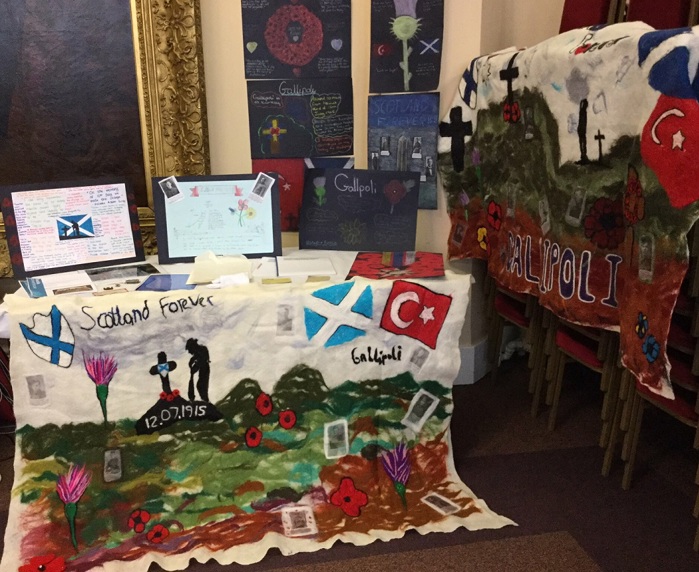
Banners from Hawick High School (Photo: L. Edmonds)
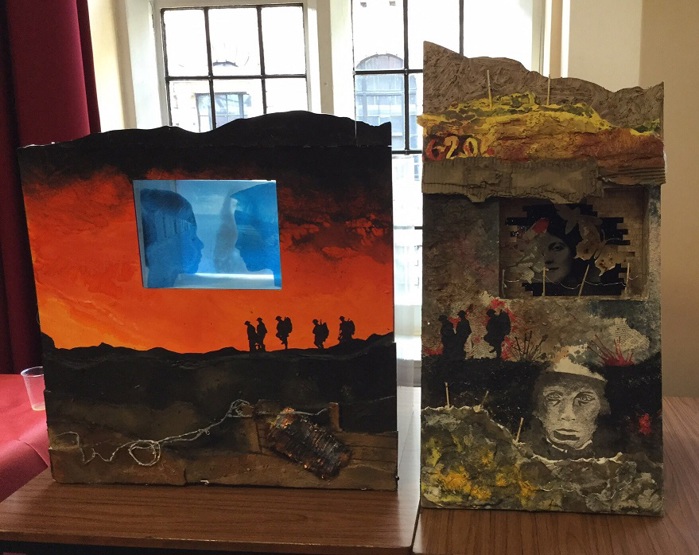
3D artwork from West Buckland School (Photo: L. Edmonds)
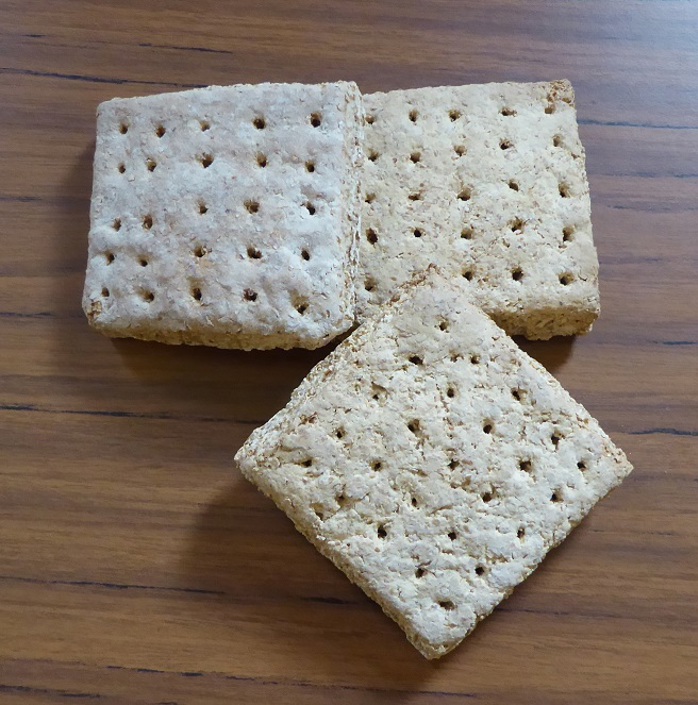
‘Anzac buscuits’ baked in Dublin (photo: R. Clutterbuck)
During lunch and breaks, delegates were able to explore the projects in more depth, as everyone had brought exhibitions. Many of these also included complete films and works of art such as the West Buckland School sculptures, and banners from Islington and Hawick. One of the star exhibits was a selection of ‘Anzac biscuits’ baked to a brick-like consistency by the delegation from Dublin.
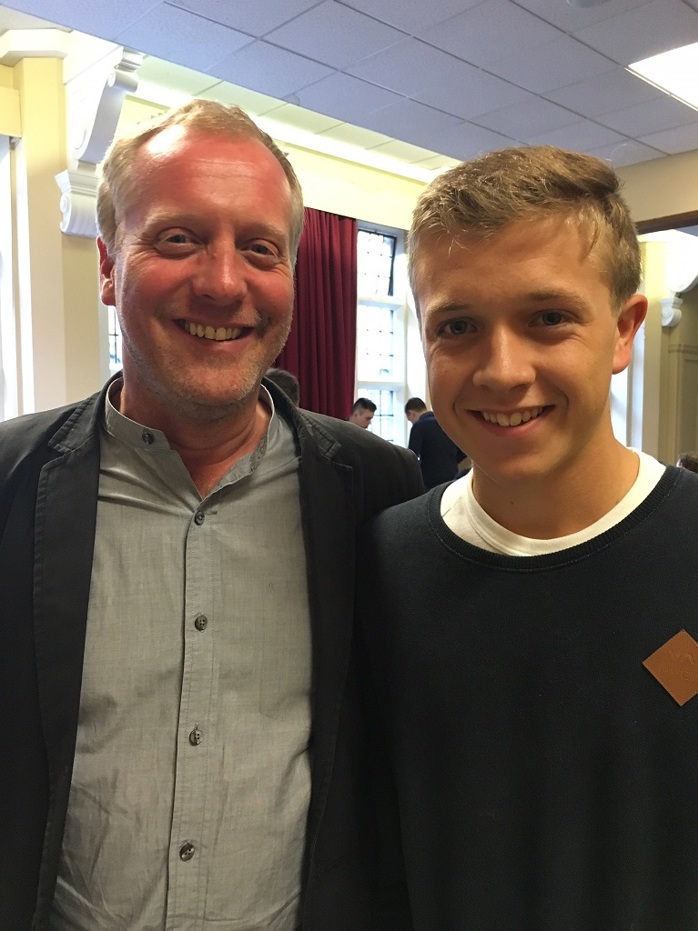
Martin Purdy (left) and Kob Watson made us think about different perspectives of Gallipoli (Photo: C. Watson)
The conference moved to wider perspectives when our Australian guest speaker Kobi Watson told us about his year. He was one of a select few secondary age pupils to be selected to attend the Anzac Day Dawn Service in Gallipoli on 25th April 2015, a century to the day after his grandfather landed at Anzac Cove and became the first soldier to be decorated for his bravery during the Campaign. Kobi had worked with a film-maker in Melbourne and showed us the film of his very moving story, helping us understand something of the reverence in which Gallipoli is held in Australia.
Three schools in Ireland were represented at the conference, and with the centenary of the Easter Rising imminent we were very fortunate that they felt that the Gallipoli conference was important enough event to attend at this time. We saw a film of the choir from Portmarnock School in Dublin as they sang a beautiful arrangement of ‘Keep the Home Fires Burning’, and students from Trinity School showed us the research they had done into soldiers from the Royal Dublin Fusiliers.
Travelling from even further afield, students from Gaelscoil Chiarrai (Kerry) gave a profound insight into Irish culture by showing us a film of a play developed by the students about the fortunes of the Royal Munster Fusiliers at Gallipoli. The whole play was done in Gaelic. After this, everybody in the room was fully aware of the distinctiveness of Irish culture and appreciated why three months after the Gallipoli Campaign they rose against British rule.
From Edinburgh, students from Portobello and Leith had travelled to Gallipoli in October 2015 as part of much wider projects. We heard about the trip and the questions this raised about international affairs, and we also heard how at Leith Academy a huge research project traced the stories of each of the soldiers killed in the Quintinshill rail disaster, including the actual routes walked by their families from their homes to the memorial in Edinburgh, marked by poppies stencilled onto the pavements.
The Portobello High School students had used the schools Roll of Honour to research the former pupils who had died at Gallipoli. During the trip they visited the graves of these soldiers and on their return they focussed on remembrance, with moving creative pieces outlining their reflections on what war actually meant to them today as 21st century teenagers looking back at the young men who left their streets to go to their deaths a century earlier.
We needed the Turkish perspective and were delighted that Dr. Burçin Çakır was able to join us. Far from just talking about the Turkish view of the Campaign, she put Gallipoli into a contemporary international context for us, looking at how the current government saw it, and how this was far more related to modern concerns such as the tourist ‘dollar’ and a pragmatic effort to encourage ties with Australia. She also commented on the worrying trend towards nationalist revisionism, with the creation of ‘founding myths’ over recent years. Of all the presentations this provoked the most discussion and students in particular were fascinated by the sudden awareness that Gallipoli lived very much in the present. Download a PDF of her presentation here.
The Gallipoli Centenary Education Project has employed creative arts approaches in most of its regional activities. Students and teachers have developed new skills through the activities and to give a practical insight into these ways of working we held two workshop sessions – a session on object handling from museum expert Julian Vayne and a drama session with Daniel Jessop called ‘Making up the past?’, both of which brought us face to face with issues around questioning and interpreting the historical evidence that has come down to us.
Our final session was delivered by two students from the first school that we worked with during the project – Bay House School. The school is close to the Royal Navy Submarine Museum in Gosport and the presentation showed an important but lesser known aspect of the Gallipoli Campaign – the role that submarines played in disrupting Turkish supply lines and, more significantly, the psychological effect of this unseen threat, which was brand new technology in 1915.
Representing the Gallipoli Association, Lyn Edmonds concluded the day by presenting certificates to the students who had contributed to the event.
Evaluation carried out during the day was extremely positive. While 87% of delegates felt that their knowledge of Gallipoli was already good, 94% said that even so their knowledge and awareness of the Gallipoli Campaign had increased. Furthermore, many also felt that the conference had changed their attitudes about the significance of Gallipoli for us today, not only in terms of individual and community sacrifice but as an important reference point for understanding nationalism and contemporary global issues. Download the evaluation report here.
